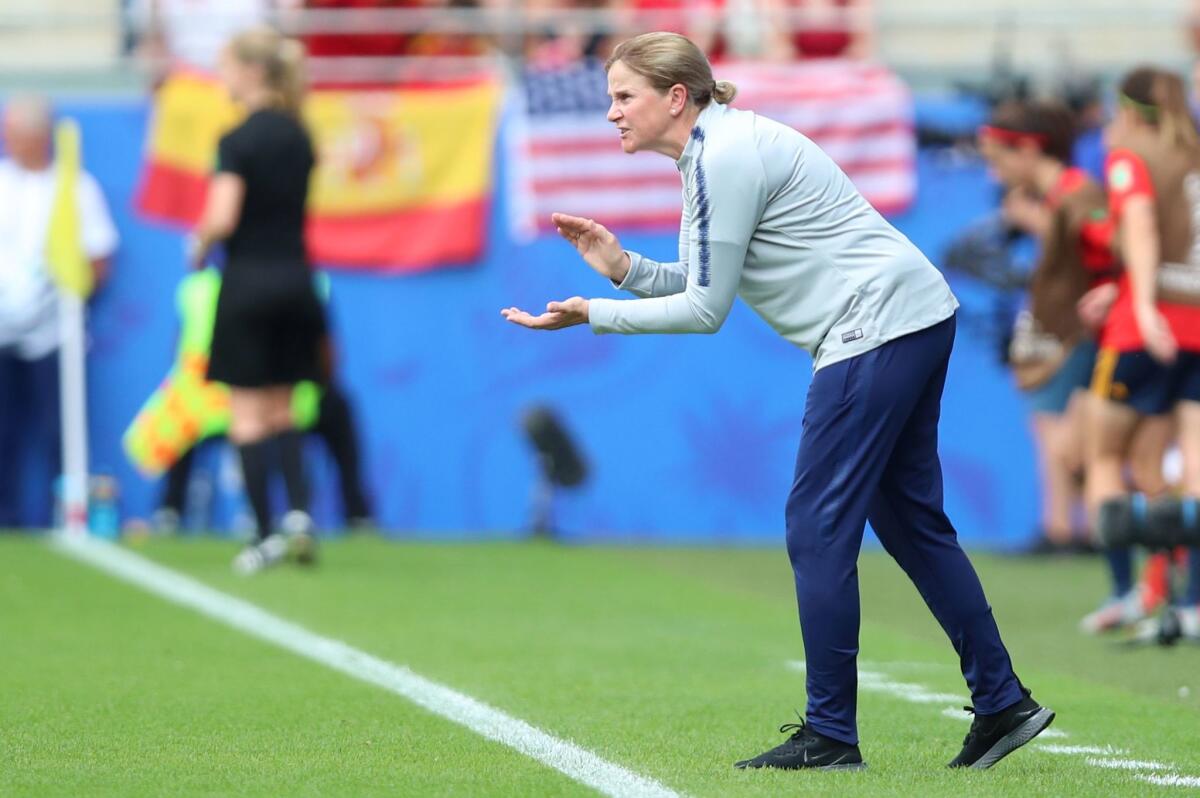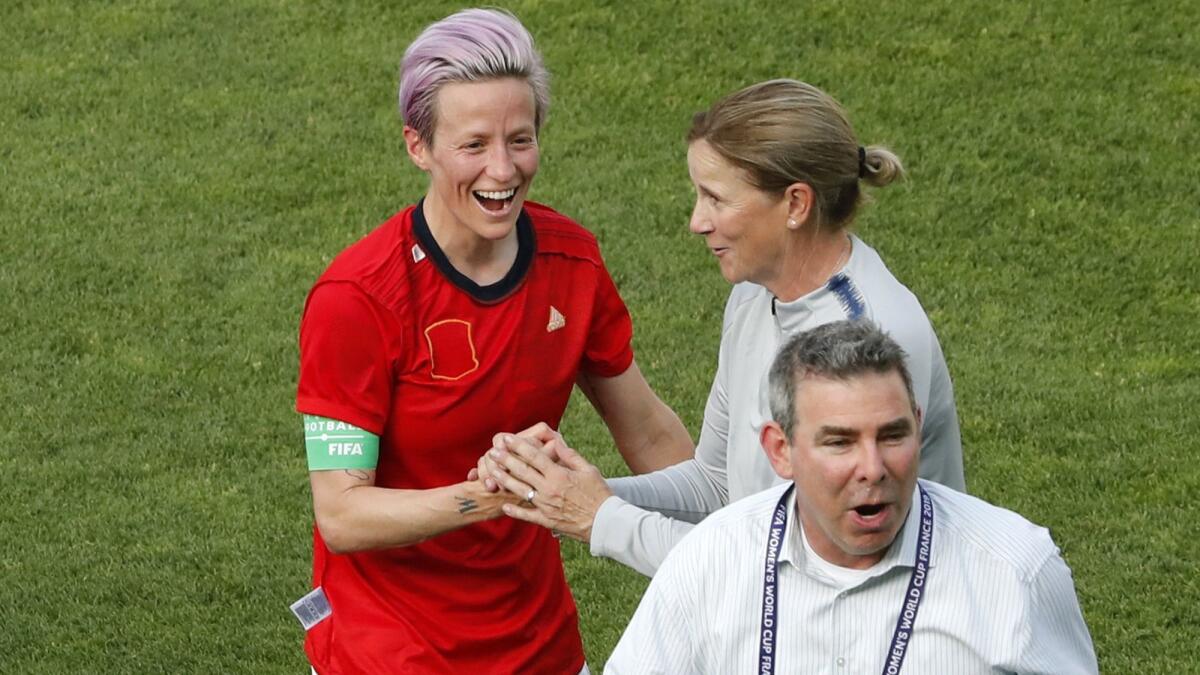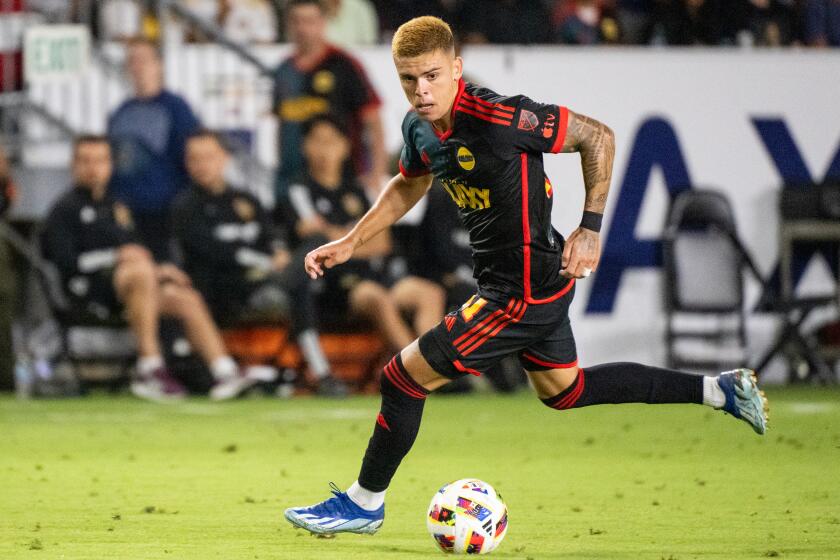Column: Women’s World Cup: Is Jill Ellis too cautious or is she too adventurous?

Jill Ellis is too cautious. The U.S. Women’s World Cup coach didn’t go to her deep bench early enough in a tense 2-1 victory over fearless Spain on Monday, ignoring the damage of the stifling heat and the persistent physicality of a team that had nothing to lose against the defending champion Americans. Ellis should have unleashed big-game scorer Carli Lloyd sooner than the 85th minute of a game that would be extended seven minutes by injury time. And can anyone figure out why Ellis didn’t take advantage of Lindsey Horan’s commanding presence and put Horan in the starting 11, instead of bringing her into the game in the 89th minute?
Jill Ellis is too adventurous. She experimented with different formations during the runup to the World Cup and developed a pattern of moving players out of position. Some of those moves involved shifting Julie Ertz from center back — the position Ertz plays for her club team — to midfield, turning Kelley O’Hara from an attacking player into a defender, and deploying speedy Crystal Dunn as a defender instead of as an attacking player. Ellis says moving players around helps prepare them for disruptions of suspensions and injuries. That makes sense. Still, why mess with players’ comfort zones and instincts?
The truth about Ellis’ coaching style lies between those extremes. The key point is that she has endured, reinventing the team’s tactics after a shocking 2016 Olympic quarterfinal loss that is a line of demarcation between eras, as well as surviving a player revolt that Sports Illustrated reported arose in 2017 over her tactics and faulty communication skills.
Almost forgotten in the social-media roasting she endured after the drama of Megan Rapinoe’s two penalty-kick goals and the team’s too-narrow escape from Spain clutches on Monday was that Ellis tied April Heinrichs’ program record by coaching in her 124th game. Ellis, the only woman to coach the U.S. to a World Cup championship — Anson Dorrance was the coach in 1991 and Tony DiCicco in 1999 — was paid $291,029 in fiscal year 2018, according to information on U.S. Soccer’s website.
That’s about $3 million less than Jurgen Klinsmann was paid to not coach the U.S. men’s team, which lost in the round of 16 in the 2014 World Cup. Ellis can become the first person to coach a men’s or women’s squad to two World Cup titles since Vittorio Pozzo led the Italian men to wins in 1934 and 1938. She will break the program record on Friday, when the U.S. women face dangerous France at Parc des Princes in Paris.
“This is the game. You want this game,” Ellis said on Monday. “It’s going to be exciting.”
Ellis has never lost a World Cup game, but Friday’s matchup will be her toughest test. Spain was an example of how quickly some opponents are catching up to the U.S. women. France is capable of pulling even or winning if the Americans aren’t at their best.
To reach this point Ellis prepared carefully and with a long-term view in mind. She insisted the U.S. play Spain and France in friendly matches in Europe early this year so players could become familiar with the opponents, atmosphere and tactics they’d face here. She scheduled games every three days, again to simulate World Cup conditions. That’s paying off by establishing a rhythm for a team that has gotten less rest than some other quarter finalists.
As for her tinkering with the lineup, players have said they understand her motivation. “This team is extremely deep. Whoever Jill decides to put on the field, she feels confident that they’re going to get the job done and I can tell you that every other player feels confident that whoever she puts on the field is the right combination of players to win the game,” O’Hara said last week. “And I think that’s what the coaching staff has tried to build us towards, for this tournament, so we can be extremely versatile, extremely dangerous, but also just a solid team defensively.”
Reserve defender Ali Krieger said the mixing and matching on defense hasn’t been a problem. “I think it’s just all about communication and understanding each other’s roles and relationships on the field,” she said. “We’ve had a lot of time together and I think we’re very interchangeable. It takes a lot of connectedness and communication back there and you could see that…. All the defenders here are very, very willing to get better every day and look at the little details we need to fix and then apply it to the game.”
Ellis explained she didn’t start Horan on Monday because Horan had gotten a yellow card in the second group game, and Ellis didn’t want to risk losing the player for a game if she got another yellow card. The timing of bringing Horan off the bench was dictated by the flow. “You can’t just live cautiously, I think, when you’re in a knockout game. I think you have to coach in the moment and make those decisions,” Ellis said. “It felt that we started to gain momentum, and I think as a coach you have to read that moment.”

Ellis also said she doesn’t consider the starting lineup to be fixed or sacred. “I think people get hung up on starters and 11s and that number kind of rings through a lot of media’s heads,” she said, “but when I look as a coach, I look at 14, 15 starters and that’s the beauty of having such a deep roster.”
It’s Ellis’ job to bring to Friday’s match the right mix of caution, boldness and pure gut instinct to guide this team toward another World Cup championship. Anything less will be considered a failure.
Twitter: @helenenothelen






